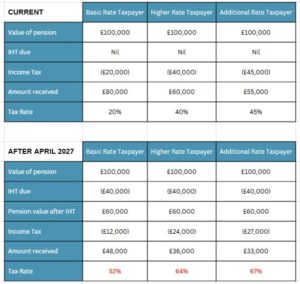
When considering the most important aspects of a long-term financial plan, many would immediately focus on savings, investments, and retirement planning. Whilst these are undoubtedly key areas, protection is a core pillar of financial planning which is often overlooked. Life is unpredictable, and events such as long-term illness or death can derail the most carefully constructed plans. By holding adequate protection, you can ensure that financial goals for your family can be met, even when life doesn’t go to plan.
Audit your existing cover
Reviewing the level of life cover you hold can be a valuable exercise in determining what your loved ones would receive in the event of your death.
For those who are employed, a good starting point is to review whether you would benefit from Death in Service in the event of your death. Whilst not mandatory, employers often provide Death in Service policies, as they are a cost-effective benefit and a way to attract and retain staff. Whilst having some similarities to a standard life insurance policy, instead of paying out a specific lump sum on death, the amount paid is usually expressed as a multiple of salary. For example, a scheme paying three times salary to an employee earning £75,000 per annum would provide cover of £225,000 in the event of death whilst employed.
It is, however, important to bear in mind that you may not be in the same job for the remainder of your working life, and could potentially receive less generous cover, or even be without cover, if you change employer.
The other most popular form of life cover are policies taken out to cover outstanding mortgage debt. Most policies taken out for this purpose are established on a Decreasing Term basis, where the amount of life cover provided drops by a set amount each year to reflect the falling mortgage balance. It is important to consider whether changes to your mortgage over time, through further borrowing or an increase in term, are reflected in the level of cover you hold.
Putting cover in place in the event of death is only part of a sensible protection plan. Being unable to work due to long-term ill health or injury can also cause financial hardship and potentially undermine your financial planning decisions. Employers can offer protection in the event of long-term sickness, in the form of an Income Protection policy. This cover pays a monthly income of up to 70% of your basic salary, if you are unable to work due to illness or injury, providing funds to help you continue to meet ongoing financial commitments.
Are you adequately covered?
When assessing whether you hold sufficient cover to protect your family from life’s challenges, it is easy to just consider whether the cover would meet existing liabilities, such as mortgage or other debt.
Whilst holding life cover to settle an outstanding mortgage balance is obviously sound financial planning, this would do little to provide additional funds to cover day-to-day living costs and other expenditure for family members left behind. Although the burden of mortgage payments would be removed, the loss of earnings caused by the death of the main income provider in a family could mean that surviving family members struggle to cover ongoing costs, in addition to other longer-term financial commitments, such as funding further education for your children.
Self-employed and business owners
Whilst those who are employed can benefit from Death in Service and other protection policies provided by their employer, those who are self-employed need to pay particular attention to the level of protection they hold, as there is no safety net in place.
Directors and small business owners can arrange Relevant Life Cover, which acts as a standalone Death in Service policy, which is arranged and funded by the employer, but pays out to the employee’s family or chosen beneficiaries if the employee dies during the policy term. Premiums paid are typically treated as a legitimate business expense, offering potential Corporation Tax relief.
Income Protection is equally important, as a long-term illness or injury can lead to an immediate loss of earnings, without the benefit of the safety net available to those who are employed. Without this protection, individuals may be forced to dip into long-term savings—if available—to cover the ongoing cost of living, which can potentially damage future financial plans.
For small business owners, the prolonged ill health of a key person can disrupt revenue and pose a serious threat to business continuity. This impact extends beyond the individual unable to work, affecting employees and the overall stability of the business.
How we can help
No matter how much energy is devoted to making the right plans for long term saving, without adequate protection against death or serious ill health, the best laid financial plans for your family – or business – can be undermined. It is, therefore, important to consider your existing protection arrangements, to identify potential gaps that could place your financial plans in jeopardy.
Our experienced advisers can undertake a comprehensive review of your existing arrangements and provide recommendations to alter existing cover or establish new policies to ensure your family are protected in the event of death, or long-term ill health. We can advise business owners on ways to not only protect their personal finances, but the health of their business too.
As an independent firm, we can access providers from across the marketplace to find the right solution that is tailored to meet your needs. Speak to one of our experienced team to start a conversation.















